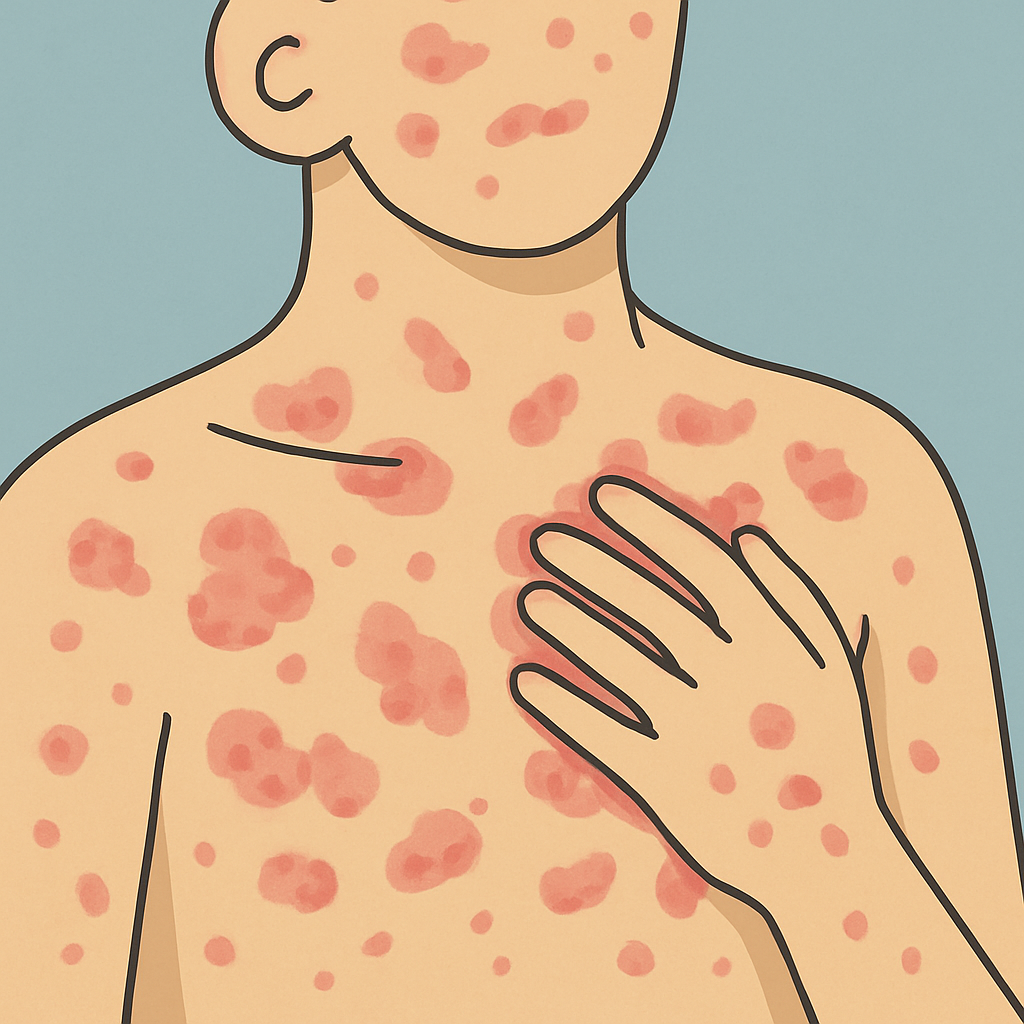Understanding Chronic Urticaria: Causes, Autoimmune Factors, and Spontaneous Outbreaks
.avif)

have already shared their stories
Chronic urticaria, commonly known as chronic hives, is a persistent skin condition characterized by the recurrent appearance of itchy welts or hives on the skin. This blog post will explore chronic urticaria in depth, focusing on chronic autoimmune urticaria, causes of chronic urticaria, and spontaneous chronic urticaria. Understanding these aspects can help individuals manage their condition more effectively.

What is Chronic Urticaria?
Chronic urticaria is defined as the presence of hives for more than six weeks. Unlike acute urticaria, which typically resolves quickly, chronic urticaria can persist for months or even years. The condition can significantly impact quality of life, causing discomfort and distress.
Causes of Chronic Urticaria
Common Triggers
While the exact cause of chronic urticaria often remains unknown, several factors can trigger or exacerbate the condition. Common causes include:
- Allergens: Foods, medications, insect stings, and environmental allergens can cause hives in susceptible individuals.
- Physical Factors: Heat, cold, pressure, sunlight, and exercise can trigger hives in some people.
- Infections: Viral, bacterial, or fungal infections can provoke or worsen chronic urticaria.
- Stress: Emotional stress and anxiety can exacerbate symptoms, making hives more pronounced and persistent.
Chronic Autoimmune Urticaria
Chronic autoimmune urticaria is a subtype of chronic urticaria where the body's immune system mistakenly attacks healthy tissues. This autoimmune reaction can lead to the persistent and recurrent appearance of hives.
Mechanism
In chronic autoimmune urticaria, the immune system produces autoantibodies that target the body's own cells, specifically the mast cells and basophils. These autoantibodies cause the release of histamine and other inflammatory mediators, leading to the development of hives.
Diagnosis and Management
Diagnosing chronic autoimmune urticaria involves blood tests to detect the presence of autoantibodies and other markers of autoimmune activity. Treatment typically includes antihistamines, immunosuppressants, and biologics like Omalizumab to manage symptoms and reduce the immune system's overactivity.

Spontaneous Chronic Urticaria
Understanding Spontaneous Outbreaks
Spontaneous chronic urticaria, also known as chronic idiopathic urticaria, occurs without an identifiable trigger. Patients experience recurrent hives without any clear cause, making it challenging to predict or prevent outbreaks.
Symptoms and Impact
Symptoms of spontaneous chronic urticaria include itchy welts that can vary in size and location. These hives can appear and disappear randomly, often causing significant discomfort and frustration. The unpredictability of spontaneous outbreaks can severely impact a person's quality of life, affecting sleep, work, and daily activities.
Treatment Approaches
Managing spontaneous chronic urticaria involves symptomatic treatment to reduce itching and discomfort. Common treatments include:
- Antihistamines: Regular use of non-sedating antihistamines can help control symptoms by blocking the effects of histamine.
- Biologics: Omalizumab, a monoclonal antibody, has shown effectiveness in treating spontaneous chronic urticaria by targeting IgE antibodies involved in the allergic response.
- Lifestyle Modifications: Identifying and avoiding potential triggers, maintaining a healthy diet, and managing stress can help reduce the frequency and severity of outbreaks.
Conclusion
Chronic urticaria is a complex condition with multiple causes and contributing factors. Understanding chronic autoimmune urticaria, the various causes of chronic urticaria, and the nature of spontaneous chronic urticaria is essential for effective management. By working closely with healthcare providers, individuals with chronic urticaria can develop personalized treatment plans that alleviate symptoms and improve their quality of life. If you experience persistent or recurrent hives, consult a healthcare professional for an accurate diagnosis and appropriate treatment.

have already shared their stories
Sources
- Caffarelli, C., Paravati, F., El Hachem, M., et al. (2019). Management of chronic urticaria in children: a clinical guideline. Italian Journal of Pediatrics, 45, 101. https://doi.org/10.1186/s13052-019-0695-x
- Kolkhir, P., Giménez-Arnau, A. M., Kulthanan, K., et al. (2022). Urticaria. Nature Reviews Disease Primers, 8, 61. https://doi.org/10.1038/s41572-022-00389-z
- Zhao, Z.-T., Maurer, M., et al. (2021). Expert consensus on the use of omalizumab in chronic urticaria in China. World Allergy Organization Journal, 14(1), 100610. https://doi.org/10.1016/j.waojou.2021.100610
- ASCIA. (2021). References: Chronic Urticaria. Australian Society of Clinical Immunology and Allergy. Retrieved from https://www.allergy.org.au/hp/papers/references-chronic-urticaria
- Magerl, M., & Maurer, M. (2019). Chronic Urticaria: An Overview of Treatment and Recent Patents. Journal of Investigational Allergology and Clinical Immunology, 29(2), 81-90. https://doi.org/10.18176/jiaci.0365










